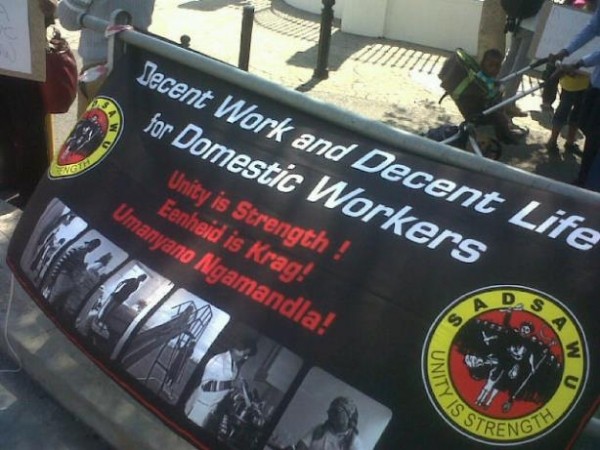
South African Domestic Services and Allied Workers Union (SADSAWU) protesting outside parliament (2015). Archive photo: Bernard Chiguvare.
11 November 2016
South African Domestic Service and Allied Workers Union (SADSAWU) says the work of domestic workers is not taken seriously by the Department of Labour.
On 1 November the Department of Labour released the new minimum wage for domestic workers for area A which covers major metropolitan municipalities and cities, and area B which mostly covers rural areas. The new wages come into effect on 1 December.
Area A rates are up 8.6% and area B rates are up 10.6%.
Domestic workers in area A who who work more than 27 hours a week will have an hourly rate of R12.42, up from R11.44. The weekly rate will increase to R559.09 from R514.82. The monthly rate is R2422.54 a month up from R2230.70.
Also in area A, people working less that 27 hours a week will have an hourly rate of R14.54 up from R13.39, a weekly rate of R392.58 up from R361.50 and a monthly rate of R1,701.06 up from R1566.35.
In area B domestic workers who work for more than 27 hours a week will have an hourly rate of R11.31 up from R10.23‚ a weekly rate of R508.93 up from R460.15 and a monthly rate of R2205.17 up from R 1993.82.
In area B those working less than 27 hours a week will have an hourly rate of R13.35 up from R12.07, a weekly rate of R360.54 up from R325.98 and a monthly rate of R1,562.21 up from R 1412.49.
Sindiswa Ningiza, an organiser at SADSAWU, says the union has been asking the department for R3,500 as the minimum wage for domestic workers.
“We want the same amount for all domestic workers. We do not like that domestic workers are being divided into two groups. The work is the same and therefore should be treated equally whether in the City or in rural areas,” she said. Area A workers have a minimum wage that is about 10% higher than Area B ones.
“Most families spend more than R2,000 monthly on groceries and that’s without transportation and rent,” said Ningiza.
She says they have made many submissions to the Department of Labour and were hoping these would influence this year’s increase.
“We feel isolated, the work of domestic workers is taken for granted,” said Ningiza. “They refuse to listen to the workers, as if there is no need for them. If we take the decision to stop our services a lot of people would suffer. These people leave their children from five in the morning till late evening looking after other families and they have nothing to show for it at the end of the month.”
In a statement released by the department of labour spokesperson Mokgadi Pela said the minimum wage adjustment is in line with the Basic Conditions of Employment Act which is regulated through the Sectoral Determination.
“Domestic Workers are by law classified as vulnerable, hence the Sectoral Determination governing minimum wage and conditions of employment,” said Pela.
Domestic workers include housekeepers, gardeners, nannies, domestic drivers among others.